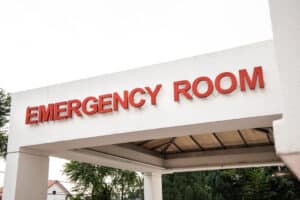Have you ever wondered, is your toothache a dental emergency? Toothaches are one of the most common reasons people seek dental care, and while some tooth pain can be managed with over-the-counter treatments, others require immediate attention.
Tooth pain can range from mild irritation to severe, urgent problems. This guide explains how to recognize the signs of a true dental emergency, when to seek immediate care, and what you can do for temporary relief at home.
Signs That Answer: Is Your Toothache a Dental Emergency?
Knowing the signs of a dental emergency can help you determine whether your toothache needs immediate attention. Here are some indicators that you should see a dentist right away:
- Severe, Persistent Pain: If you’re experiencing intense pain that doesn’t subside with pain relievers, it may indicate a serious underlying issue, such as an abscess or nerve damage. When this happens, is your toothache a dental emergency? Absolutely—persistent pain is a red flag.
- Swelling or Abscess Formation: Visible swelling around the tooth or gums, especially if accompanied by pus, could mean you have an infection. Dental infections can spread and lead to serious health issues if not treated quickly.
- Difficulty Opening Your Mouth: If you have difficulty opening your mouth or moving your jaw due to pain or swelling, it may signal an infection or trauma that needs immediate attention.
- Loose or Dislodged Teeth: Whether from trauma or decay, any tooth that feels loose or has been knocked out is considered a dental emergency. Immediate care can sometimes save the tooth.
- Fever or Other Symptoms: If your toothache is accompanied by a fever or general malaise, it could indicate a more serious infection spreading to other parts of your body. In this case, the answer to is your toothache a dental emergency is almost always yes.
When to Seek Immediate Care
If you’re experiencing any of the above symptoms, it’s essential to visit a dentist as soon as possible. Delaying treatment can result in worsening pain, further damage to the tooth, or even more severe health problems. A quick visit to the dentist could save you from costly and extensive procedures later on.
Here are some specific scenarios where immediate dental care is necessary:
- A knocked-out tooth requires urgent care for the best chance of reattachment.
- Any signs of an abscess, such as swelling, fever, or bad breath, should be treated immediately to prevent the infection from spreading.
Home Remedies for Temporary Relief
If you’re unable to see a dentist right away, there are a few safe remedies that may provide temporary relief. However, these should not replace professional dental care.
- Over-the-Counter Pain Medications: Non-prescription pain relievers like ibuprofen can help manage the discomfort until you can see your dentist.
- Cold Compress: Applying a cold compress to the outside of your cheek can help reduce swelling and numb the area temporarily.
Remember, while these methods might alleviate symptoms, they don’t address the underlying problem. Be sure to schedule an appointment with your dentist as soon as possible.
Final Thoughts: Is Your Toothache a Dental Emergency?
So, is your toothache a dental emergency? Toothaches can range from minor discomfort to serious dental emergencies. Understanding when to seek professional help is crucial to maintaining good oral health. If you’re experiencing severe pain, swelling, or any other symptoms of a dental emergency, don’t delay—reach out to a dentist right away. And of course, regular dental check-ups can help prevent many of the issues that cause toothaches in the first place.
Want to know how your daily nutrition affects your teeth? Check out our post,
Diet and Oral Health: 1 Powerful Factor Behind a Healthier Smile, and discover how simple dietary changes can boost your oral health and reduce the likelihood of toothaches. For additional trusted information, the
American Dental Association’s guide to dental emergencies is a valuable resource.
FAQs About Toothaches and Dental Emergencies
How do I know if my toothache is a dental emergency?
If your pain is severe, persistent, or accompanied by swelling, fever, or difficulty opening your mouth, and you are asking yourself: is your toothache a dental emergency? In most cases, these symptoms do signal an infection or injury that needs immediate care. A quick call to an emergency dentist can prevent serious complications.
What should I do if I think my toothache is a dental emergency?
First, determine the severity of your symptoms. If you have intense pain, a knocked-out tooth, or visible swelling, the answer to is your toothache a dental emergency is yes—seek emergency dental care right away. In the meantime, use a cold compress or over-the-counter pain relievers for temporary relief.
Can home remedies help if my toothache is a dental emergency?
While home remedies such as saltwater rinses, ibuprofen, or cold compresses can reduce pain, they do not address the root cause. If you’re asking, is my toothache a dental emergency?, and your symptoms include swelling, fever, or severe pain, skip home remedies and contact a dentist immediately.




